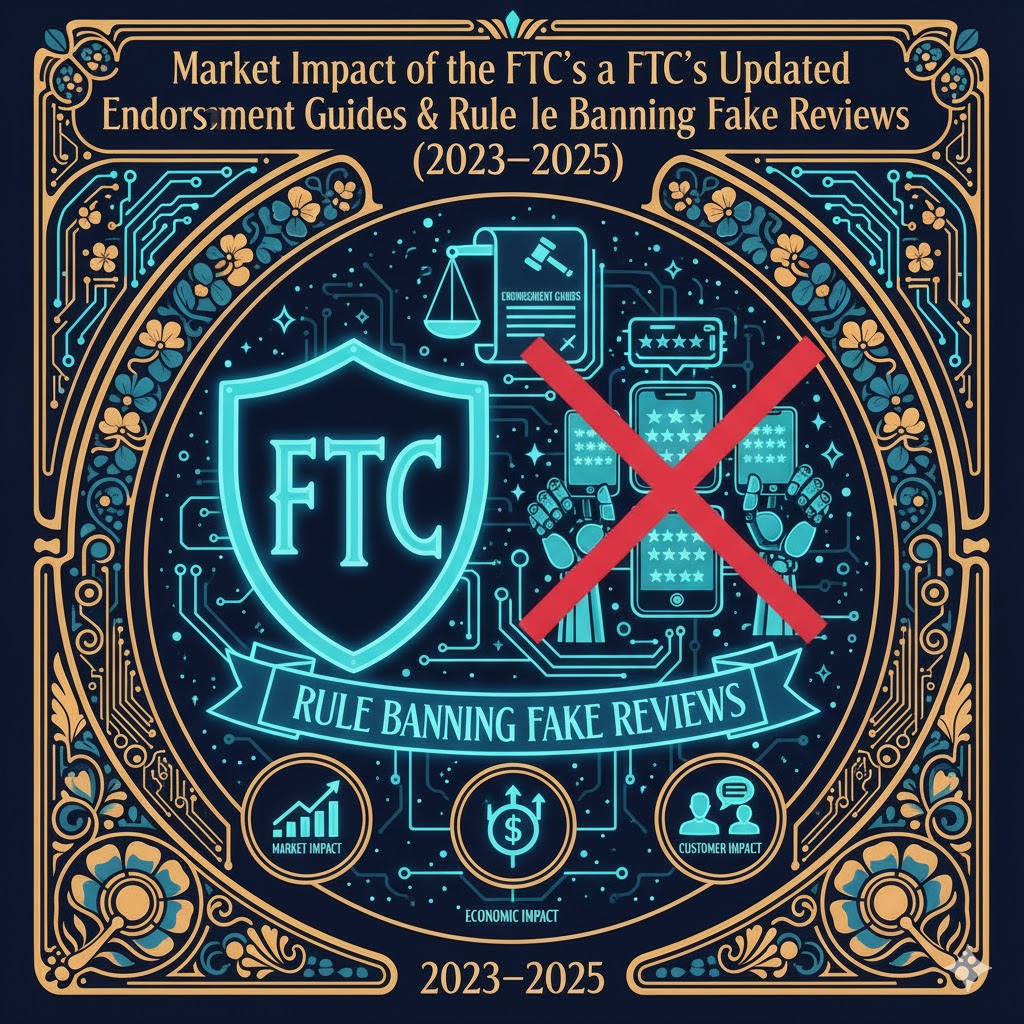Introduction
The U.S. Federal Trade Commission (FTC) revised its Guides Concerning the Use of Endorsements and Testimonials in Advertising in June 2023 and issued a final rule banning fake reviews and testimonials in August 2024. The updated Guides clarify that endorsements include any marketing message that consumers might think reflects someone else’s opinions, even social‑media “tagging,” virtual influencers and AI‑generated personasarnoldporter.com. Advertisers, endorsers and intermediaries must disclose material connections (payments, gifts, business or personal relationships) clearly and conspicuously; disclosures must not be easy to miss and must use the same medium as the endorsementarnoldporter.com. The 2024 rule bans the creation, sale or purchase of fake or artificially generated reviews, prohibits buying reviews for a particular sentiment, requires insiders to disclose their connections, outlaws company‑controlled “independent” review sites, forbids suppressing negative reviews and bans fake indicators of social‑media influencebabl.ai. Violations carry civil penalties of up to $51,744 per incidentbabl.ai and the FTC has already filed enforcement actions and multimillion‑dollar settlements in 2025babl.ai.
These measures reflect growing concern over the economic harm from deceptive reviews. Studies estimate that about 30 % of online reviews are fake, and fake reviews cost U.S. businesses around $152 billion annually in reputational damage and lost salesinvespcro.com. Globally, fake reviews influence roughly $791 billion in e‑commerce spending in the U.S. and $152 billion overallweforum.org. Research commissioned by the FTC found that fake reviews mislead consumers into purchasing lower‑quality products, allow manipulative sellers to raise prices and erode long‑term trust, harming consumer welfareftc.gov. In this report, we analyze how the new guidelines and rule affect the digital marketing market, the broader economy and consumers.
Top picks for "market impact updat"
Open Amazon search results for this keyword.
As an affiliate, we earn on qualifying purchases.
Market Effects
1. Increased compliance costs and legal exposure
- Heightened liability for advertisers, influencers and intermediaries. The revised Guides clarify that advertisers are responsible for monitoring their endorsers and that influencers and intermediaries can be held liable when they know or should know that statements are deceptive or that material connections are undisclosedarnoldporter.com. Companies now face civil penalties of up to $51,744 per violation and potential class‑action lawsuits; the Revolve class‑action filed in 2025 seeks $50 million for failing to disclose influencer relationshipspierceatwood.com. Platforms must provide clear disclosures and cannot rely solely on built‑in “paid partnership” tools, as the FTC’s November 2023 warning letters indicatedhallrender.com.
- Compliance monitoring and training. Businesses must audit influencer campaigns, require written policies for disclosure, and monitor content to ensure compliance. This increases operational costs, especially for small and mid‑sized enterprises, but it reduces the risk of penalties and reputational damage. Law firms recommend routine audits, employee training and contractual obligations for influencers to disclose material connectionsmunizzilaw.com.
- Shift towards long‑term, transparent partnerships. Influencer marketing is moving toward longer partnerships and micro‑influencers. The Influencer Marketing Hub notes that the global influencer marketing industry is expected to reach $32.55–$33 billion in 2025, and 63.8 % of brands plan to partner with influencersinfluencermarketinghub.com. Long‑term collaborations allow better oversight and more authentic content, reducing the risk of non‑compliance.
2. Growth of affiliate marketing and need for clear disclosures
- Rapidly growing sector. Affiliate marketing is projected to grow 10 % annually and reach $12 billion by 2026; 90 % of e‑commerce companies are expected to use affiliate programswecantrack.com. Micro‑influencer partnerships are forecast to expand by 25 % annually, and revenue‑sharing models are becoming prevalentwecantrack.com. This growth increases the number of endorsements and links that require disclosure.
- Need for unambiguous affiliate disclosures. The Guides stress that terms like “affiliate link” or “Buy now” are not sufficient; disclosures must state that the influencer receives compensation when consumers click or buyftc.gov. Disclosures must be placed immediately above the call‑to‑action and must be difficult to miss on any deviceftc.govhallrender.com. Failure to do so can result in FTC enforcement and consumer lawsuits.
- Platform investments and technology solutions. Major platforms are investing to detect and remove fake reviews; Google removed 170 million policy‑violating reviews in 2023 (a 45 % increase over 2022) and Trustpilot removed 3.8 million fake reviews in 2024shapo.io. Companies are adopting AI‑powered review verification and blockchain‑based tracking to ensure authenticity. These innovations create opportunities for tech vendors but also additional costs for merchants.
3. Market consolidation and shift towards quality
- Disincentives for manipulative firms. The welfare study commissioned by the FTC found that fake reviews allow manipulative sellers to raise prices and increase profits while harming honest competitors and consumersftc.gov. By banning these practices, the rule eliminates an unfair advantage and forces sellers to compete on quality and price. Honest businesses benefit because the playing field is levelled; manipulative actors face fines and reputational damage.
- Focus on product quality and customer experience. Surveys show that over 50 % of consumers will not purchase a product if they suspect the reviews are fakeinvespcro.com and 54 % of buyers avoid products with suspected fake feedbackwiserreview.com. With the new rule, retailers are incentivized to invest in customer service and product quality to generate genuine positive reviews rather than gaming the system. This shift may increase marketing efficiency and reduce wasteful spending on fake feedback.
- Emergence of specialized compliance services. Law firms and consulting firms are offering compliance audits and training for businesses to understand the rules and avoid penaltiesmunizzilaw.com. Companies that provide AI‑generated reviews or “review boosting” services may see their business models collapse as enforcement actions shut them downbabl.ai. New service providers will emerge to help brands obtain authentic reviews and manage online reputation ethically.
Economic Significance
1. Consumer welfare and market efficiency
- Harm from fake reviews. The FTC‑commissioned study on Amazon found that fake reviews mislead consumers into buying lower‑quality products and allow fake review purchasers to raise prices. When fake reviews are present, the median fake review purchaser raises prices by about $0.19 while honest products reduce prices by $0.06; the net loss in consumer welfare is roughly $0.11 per purchase, or 0.4 % of the median product’s pricemarketing.wharton.upenn.edu. Overall, fake reviews result in large changes in quantities, prices and welfare; they harm consumers, benefit manipulators and increase platform profitsftc.gov.
- Aggregate economic cost. Studies estimate that fake reviews cost U.S. businesses $152 billion annually and up to $787 billion globally in 2025invespcro.com. The World Economic Forum reports that fake reviews influence $791 billion of U.S. e‑commerce spending and that an extra star on a rating can raise revenue by 5 % – 9 %weforum.org. These distortions misallocate spending, reward low‑quality sellers and impose reputational costs on honest firms. The FTC’s rule aims to reduce these welfare losses and restore efficient allocation of resources.
- Consumer trust as economic capital. Surveys show that 67 % of consumers worry about review authenticityshapo.io, and 82 % encounter fake reviews annuallyshapo.io. Mistrust reduces the effectiveness of the review system, leading to price competition and lower profits for sellers. In the FTC welfare study, when mistrust persists without fake reviews, consumers are actually slightly better off due to increased price competitionmarketing.wharton.upenn.edu. However, long‑term erosion of trust undermines the purpose of digital marketplaces. By restoring authenticity, the rule enhances consumer confidence and can increase spending on legitimate products.
2. Impact on business strategies and marketing spend
- Reallocation of marketing budgets. Companies previously spending on fake review campaigns may redirect budgets to legitimate channels: improving product quality, customer service, and authentic influencer collaborations. Micro‑influencers offer high engagement at lower cost, aligning with the trend toward authenticity. The influencer marketing platform industry is expected to reach $33 billion in 2025sproutsocial.com, and brands are increasingly focusing on long‑term partnershipsinfluencermarketinghub.com. The rule accelerates this shift by making fake review services illegal and risky.
- Compliance as competitive advantage. Businesses that proactively implement robust disclosure policies and ethical review practices can differentiate themselves. Transparent marketing fosters customer loyalty and reduces the risk of class‑action lawsuits. Companies that fail to adapt may face fines and reputational damage, leading to market exits or consolidation.
- Potential short‑term costs versus long‑term gains. Implementing compliance systems, training and monitoring will incur costs. For small businesses, these expenses may feel burdensome, but they are offset by avoiding penalties and building lasting trust. Over time, as the cost of fake reviews (both financial and reputational) outweighs the benefits, the marketplace should become more efficient and consumer‑friendly.
Consumer Implications
- Improved information quality and trust. The rule ensures that reviews and testimonials reflect genuine customer experiences, enabling consumers to make better‑informed decisions. The FTC’s rule prohibits suppression of negative reviews and requires disclosure of insider relationshipsbabl.ai, thus providing a more balanced view of products.
- Reduced price inflation from manipulated ratings. The welfare study shows that manipulative sellers raise prices when using fake reviewsmarketing.wharton.upenn.edu. Eliminating these distortions should reduce price inflation and encourage fair competition, benefiting consumers financially.
- Enhanced transparency about influencer relationships. The updated Guides require influencers to disclose material connections clearly and conspicuouslyarnoldporter.com. Consumers will better understand when content is paid or sponsored, reducing deception. However, disclosures must be designed to be understandable and nonintrusive; overly technical or hidden disclosures can still mislead, so user‑friendly wording and placement are essentialftc.gov.
- Potential increase in review skepticism. Although the rule aims to improve trust, the high prevalence of fake reviews and media coverage may make consumers more skeptical of reviews in general. Businesses must counteract this by encouraging authentic feedback and engaging with customers transparently.
Recommendations for Businesses and Marketers
- Implement rigorous disclosure protocols. Require influencers and affiliates to place clear, simple disclosures immediately above purchase links or promotional content and ensure the text is understandable to ordinary consumersftc.gov.
- Audit and monitor review practices. Regularly check that no employees or agencies are creating or soliciting fake reviews. Remove incentives tied to positive review sentiment and offer generalized solicitations instead of targeted requests for good reviewsbabl.ai.
- Invest in authenticity. Focus marketing spend on improving product quality, customer service and genuine customer advocacy. Encourage reviews through post‑purchase emails or loyalty programs without dictating sentiment. Build long‑term relationships with micro‑influencers and niche communities to foster trustwecantrack.com.
- Leverage technology for compliance. Use AI‑powered tools to detect suspicious review patterns and blockchain or other verification systems to authenticate reviews. Partner with platforms that have robust moderation, as major platforms removed millions of fake reviews in recent yearsshapo.io.
- Educate teams and partners. Provide training for marketing and customer service teams on the updated Guides and fake review rule. Ensure contracts with influencers include disclosure obligations and penalties for non‑compliance. Maintain records to demonstrate due diligence should regulators investigate.
Conclusion
The FTC’s updated Endorsement Guides and the 2024 rule banning fake reviews represent a major regulatory shift aimed at restoring trust in digital marketing. For the market, these measures increase compliance costs and legal exposure but also level the playing field by eliminating deceptive advantages. The affiliate and influencer marketing sectors—already growing rapidly—will need to adopt clearer disclosures, invest in authenticity and shift away from manipulative tactics. Economically, fake reviews distort billions of dollars in e‑commerce spending and harm consumer welfare; the new rule seeks to reduce these losses and improve market efficiency. For consumers, the changes promise more reliable information, fairer pricing and greater transparency. Businesses that embrace ethical marketing and robust compliance will be well positioned to thrive in this evolving landscape.









